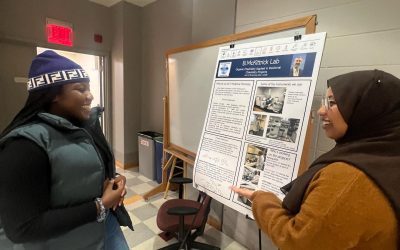Are you interested in:
- Exploring the relationship between the brain and behavior?
- Studying the mechanisms underlying neurodegenerative diseases like Alzheimer’s Disease?
- Understanding how stress can affect the brain and behavior?
- Thinking about thinking: how we sense and respond to the world around us, how we learn, how we feel?
- Creating models of neural networks?
- Pursuing a career in medicine or other health professions?

The Neuroscience major at Drew
is an interdisciplinary program of study that allows students to explore the brain from the perspectives of many different disciplines, including biology, chemistry, computer science, physics, philosophy, and psychology. The neuroscience curriculum introduces students to current theories that explain how the brain works at a variety of levels, from molecules to behavior. Intermediate and advanced coursework provides students with the opportunity to develop an increasingly more sophisticated understanding of neural and cognitive processes, while providing them with the critical thinking and technical skills necessary to actively address some of the pressing questions in neuroscience today. In addition, the wide range of electives provides students with the opportunity to think about the workings of the brain in a broader context, and to expand their study of neuroscience beyond its traditional roots in biology and psychology.
Featured Course
Core Courses
NEUR 346 – SYSTEMS NEUROBIOLOGY
The neurons of the nervous system are organized into systems that can be defined on the basis of function, anatomy or neurochemistry. This course explores the development of these systems, coordination of the activity within each system, and clinical disorders arising from malfunctions. The laboratory uses current neuroanatomical, pharmacological and neurochemical techniques to explore structure and function.
NEUR 354 – COGNITIVE NEUROSCIENCE
This course examines the mechanisms by which the nervous system supports higher mental functions, with a focus on how neural structures represent and transform information. The course draws on a variety of disciplines including cognitive psychology, neurobiology, computer science, linguistics, and philosophy. Discussion topics include perception, attention, memory, language, executive function, emotion, development, social cognition, consciousness, and neuroethics. Course activities will expose students to a variety of empirical research techniques, such as functional neuroimaging, single-neuron electrophysiology, and electroencephalography, commonly employed in cognitive neuroscience research.
NEUR 356 – CELLULAR AND MOLECULAR NEUROBIOLOGY
The structure and function of neurons, the basic building blocks of the nervous system, are investigated. The course builds to an understanding of how neuronal cell function determines higher brain processes, such as sensation and memory. The laboratory employs living neurons’ growth in culture to explore topics such as growth of neurites, cell signaling pathways, and neural degeneration.





